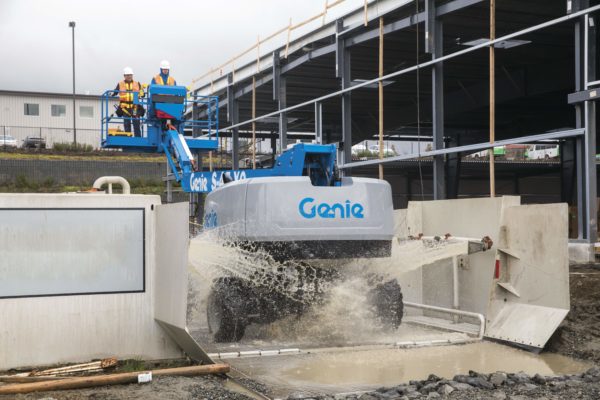Following CDC guidelines to help prevent the spread of COVID-19 on aerial job sites
Based on guidelines from the Centers for Disease Control and Prevention (CDC), Genie offers new procedures and protocols for cleaning and disinfecting aerial equipment on job sites to help prevent the spread of COVID-19 while working at height. This information provides job site superintendents and fleet managers with specific precautions to take in order to keep workers and job sites safe and productive.

“The ongoing COVID-19 global pandemic has caused significant disruptions in the aerial access industry,” says Scott Owyen, Genie Director of Training, Terex AWP. “For many weeks, aerial job sites shut down to mitigate the risk of people contracting the virus, as well as to slow the spread from those who already had it. Now, as job sites are beginning to reopen worldwide, job site superintendents and fleet managers need to think about how to best protect workers and prevent the spread of the virus. Following the CDC’s guidance, we can offer recommendations to our customers on the most effective way for aerial equipment operators to clean and disinfect machines before, during, and after each use.”
According to Owyen, the first, and number one, the goal of all aerial job sites should be to provide a safe and productive work environment for workers and equipment. To do this, Owyen says that aerial equipment operators need to take the following actions when cleaning and disinfecting machines:
Cleaning Machines 1
- Wear reusable or disposable gloves for routine cleaning and disinfection.
- Clean surfaces using soap and water, then use disinfectant.
- Cleaning with soap and water reduces the number of germs, dirt, and impurities on the surface. Disinfecting kills germs on surfaces.
- Practice routine cleaning of frequently touched surfaces.
Disinfecting Machines
- We recommend the use of EPA-registered household disinfectants.2
- Some common EPA-registered disinfectants include:
- Fantastik® All-Purpose Cleaner
- Scrubbing Bubbles® Disinfectant Restroom Cleaner II
- Lysol® Bathroom Cleaner
- Lysol® Brand Bleach Mold and Mildew Remover
- Some common EPA-registered disinfectants include:
- Follow the instructions on the label to ensure the safe and effective use of the product. Read the EPA’s infographic on how to use these disinfectant products safely and effectively. Many products recommend:
- Keeping surface wet for a period of time (see product label)
- Precautions such as wearing gloves and making sure you have good ventilation during the use of the product
- Diluted household bleach solutions may also be used if appropriate for the surface.
- Check the label to see if your bleach is intended for disinfection, and ensure the product is not past its expiration date.
- Unexpired household bleach will be effective against coronaviruses when properly diluted.
- Follow the manufacturer’s instructions for application and proper ventilation. Never mix household bleach with ammonia or any other cleanser.
- Leave the solution on the surface for at least 1 minute.
- To make a bleach solution, mix:
- 5 tablespoons (1/3rd cup) bleach per gallon of water
OR - 4 teaspoons bleach per quart of water
- 5 tablespoons (1/3rd cup) bleach per gallon of water
- Bleach solutions will be effective for disinfection for up to 24 hours. Please keep in mind that bleach may negatively affect warning labels and other safety markings.
- Alcohol solutions with at least 70% of alcohol may also be used.
“The best way to prevent the spread of COVID-19 is to avoid being exposed to it,” says Owyen. “These recommendations will help protect our equipment operators from contact with the virus while working at height, as well as assisting our customers, job site superintendents, and fleet managers in their efforts to promote safety in the aerial access industry.”
For additional information on safe work at height best practices, visit Genie Aerial Pros education site
https://www.cdc.gov/coronavirus/2019-ncov/prevent-getting-sick/disinfecting-your-home.html
2 https://www.epa.gov/pesticide-registration/list-n-disinfectants-use-against-sars-cov-2











